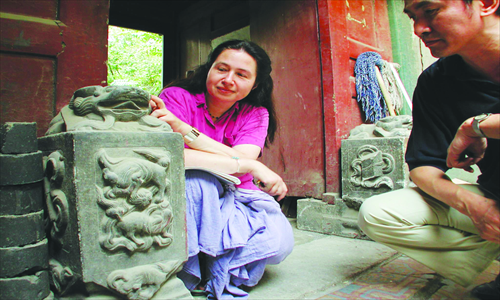The hutong protector

Hua Xinmin observes a pier made of stone that remains in an old Beijing hutong community. Photo: CFP
Though it's been 16 years, 59-year-old Hua Xinmin still remembers the first time she saw old courtyard homes in Beijing being knocked down like it was yesterday.
Bulldozers blazed through Xidan, Xicheng district in Beijing, digging into the walls of traditional hutong or old courtyard homes, causing their bricks to fall down like rain. It was a shocking sight that had then touched a nerve close to home - hers - though she would not fully realize that for another seven years.
The year was 1997, and the housing preservation advisor born of French and Chinese parents had just returned to China from abroad, where the pale-skinned and blue-eyed Hua had been living in Paris since the age of 22. Surprised at the changing scenes of the city she grew up in, dismayed at the number of demolitions occurring across town, her will to protect Beijing's old neighborhoods was inspired from all the rubble around her.
"Old homes are the soul of every city, the architecture and culture representative of the city," she told the Global Times on Wednesday. "If you lose your home, how much longer can you bare (living)?"
Credited by some locals for "saving" two hutong communities in the city, Hua said that much of the knowledge used today to help hutong owners fight government-sanctioned development projects looking to rid of old neighborhoods, was learned from experience, when she attempted to prevent her original family home from being demolished in 2005.
Born and raised hutonger
With dark hair, the mixed-race Hua who said that she considers herself a "Pekingnese," fondly remembers the courtyard home she grew up in as a young child, the one that her very own grandfather, Hua Nangui, among the first Chinese students to study abroad in the Qing Dynasty (1644-1911), built himself in the 1920s.
"Our home was almost like a small architectural replica of nature itself," said Hua, who continues to live in a traditional Beijing dwelling today at Sui'anbo Hutong.
"With the open air rushing in from the courtyard, and grass and flowers all around, living there was such a happy time as a child - it's very different than living in a tall building; people who live in apartments today probably can't imagine that kind of happiness."
Hua has the documents to prove that it was her family's home before the Cultural Revolution (1966-76). But the residents who subsequently occupied the home and agreed to be compensated some 200,000 yuan ($32,680), like many of their neighbors, to let Beijing planning authorities tear down Wuliangdaren Hutong (later renamed as Hongxing Hutong before it disappeared) in Dongcheng district, to make way for a new luxury commercial street, Jinbao Jie, has made it hard for her to convince authorities to recover her family's losses.
After years of fighting, including two failed attempts to launch lawsuits against the city's planning committee to seek compensation for the home that was taken from her family during the chaotic period, she has gotten no where with her case at Beijing No.2 Intermediate People's Court.
"I finally went to the court to check the records myself and I found that the court had labeled my case as a 'No Reply,'" she said. Countless inquiries and several letters to related government departments have also left her without answers, she added.
Still, Hua continues to reach out to residents in similar situations, who also hold paperwork proving themselves as the original owners of the homes they lost during the revolutionary days, guiding them on legal courses of action to take - though she yet to succeed in helping anyone see their properties (if remaining) returned to them or receive government compensation for what was taken from them years ago.
Fighting for private owners
Hua said that the best approach to saving the old residences in the city is to make sure that local residents are informed about their legal rights so they aren't "bullied" into acting against their will.
She said that many people in the past left their city homes to start over again in the suburbs on instruction from the government because they believed that they had no other choice. But because "they do," she continues to visit old courtyards to let people know of their options.
Her efforts have been recognized by local residents as the reason why hutong communities Jiudaowan and Dongsibatiao, both in Dongcheng, remain standing today.
Zheng Xicheng, a 75-year-old painter who still lives in Jiudaowan Hutong, said that he was inspired by Hua to fight harder for his home when the government started taking down old homes in his area in 2002, moving residents out to beyond the Fifth Ring Road.
"Hua told us that our home belonged to us and that it wasn't up to anyone in the government to tear it down without our consent; we didn't know that before," he told the Global Times.
Zheng who later got involved with Hua's efforts, said that while more than half of the homes near his neighborhood are now gone, if it weren't for her, "maybe the entire city would have been flattened."
While Hua said that she is willing to fight for the cause she believes in - until forever if need be - she laughs at the irony of the thought, and prays that day won't come soon as "there isn't much left."